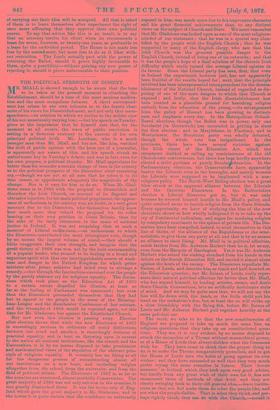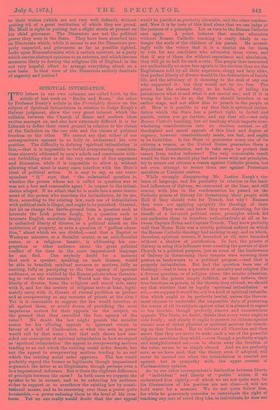THE POLITICAL STRENGTH OF DISSENT.
MR. MIALL is shrewd enough to be aware that the tone to be taken at the present moment in attacking the Establishment, should be a tone of the most anxious modera- tion and the most scrupulous fairness. A short correspond- ence has arisen in our own columns as to the drastic char- acter of his views for Disestablishment, and not only that corre- spondence,—in relation to which we incline to the milder view of his not unnaturally varying tone,—but his speech on Tuesday, gives us the impression that he himself sees that, for the moment at all events, the wave of public conviction is setting •in a direction contrary to the current of his own principal political faith. Mr. Leathern, who is a much younger man than Mr. Miall, and has not, like him, watched the drift of public opinion with the keen eye of a journalist, is apparently not aware of this, and his speech struck an unfortunate key in Tuesday's debate, and was in fact, even for his own purpose, a political blunder. Mr. Miall appreciates far better than his seconder a certain change of tone in the country as to the political prospects of the Dissenters' chief remaining cry,—though we are not at all sure that he refers it to its true causes, or apprehends adequately the magnitude of the change. Nor is it easy for him to do so. When Mr. Glad- stone came in in 1868 with the proposal to disestablish and disendow the Irish Church, on account of its flagrant and obtrusive injustice, for his main political programme, the appear- ance of enthusiasm in the country was, no doubt, in a very great measure due to the Dissenters, who themselves hardly knew how much more they valued the proposal for its reflex bearing on their own position in Great Britain, than for the sake of its tardy concession to the cause of national justice in Ireland. It was not surprising that at such a moment of Liberal eethniiasm,—an enthusiasm to which the Dissenters contributed the most triumphant note, though by no means the largest volume of sound,—they should a little exaggerate their own strength, and imagine that the gredt victory of 1868 was won not by the bold statesmanship of a popular leader, who seemed to be dealing in a broad and sagacious spirit with that one inextinguishable source of weak- ness and danger in the United Kingdom for which prime minister after prime minister had failed even to attempt a remedy, —but through the fascinations exercised over the people by the purely abstract cry for religious equality. The discus- sions which took place on the Education Act of •1870 to a certain extent dispelled the illusion, at least so far as the feeling of Parliament was concerned ; but even then the Dissenters persuaded themselves that they had but to appeal to the people in the sense of the Birming- ham League and the Manchester Conference of last autumn, and the triumphs of 1868 would be repeated again, not this time for Mr. Gladstone, but against the Established Church.
Bat now even this illusion is passing away. Election after election shows that while the new Electorate of 1867 is exceedingly anxious to obliterate all social distinctions between one creed and another, is exceedingly desirous of practical equality, and is bent on throwing open in earnest to the nation all national institutions, like the schools and the Universities, it is by no means disposed to take precisianist and mathematical views of the requisites of the abstract prin- ciple of religious equality. It certainly has no liking at all for the dangerous process of reconstructing almost all our institutions on a new basis, and excluding religion altogether from the school, from the university, and from the field of political debate. The Electorate of 1867 is, as far as the counties are concerned, almost morbidly Conservative. The great majority of 1868 was not only not won in the counties, it was greatly diminished there. It was the towns only of Eng- land which gave the great majority to Mr. Gladstone, and in the towns it is quite certain that the confidence so universally
reposed in him, was much more due to his impressive character and his great financial achievements than to any distinct views on the subject of Church and State. We must remember that Mr. Gladstone was looked upon as one of the most religious- minded of our statesmen ; that he was in a special way• iden- tified by the people with the English Church ; that he was supported by many of the English clergy, who saw that the Irish Church was the greatest possible danger to the English Church, instead of being one of its outworks ; and that it was the people's hope of a final solution of the chronic Irish difficulty which really turned the average Liberal opinion in its favour. Since the Liberal party has seen, first, that even in Ireland the experiment, however just, has not apparently been fruitful of the results hoped for; next, that the principle involved has been misrepresented intoa precedent for the disesta- blishment of the National Church, instead of regarded as dis- posing of one of the main dangers to which that Church is exposed ; and lastly, that the Irish disestablishment has been treated as a plausible ground for banishing religion entirely from the education of the young,—its estrangement from the policy of Dissent has been growing in distinct- ness and emphasis every day. In the Metropolitan School- Board elections, though the Ballot was in power, only one Secularist (in Greenwich) has succeeded in getting in singe the first election ; and in Marylebone, in Finsbury, and in Westminster, the Secularist party was wholly defeated, though the whole vote was insignificant. In the provinces, there have been several victories against the 25th clause of the Education Act, which the ratepayers disliked as calling up reminiscences of the old Church-rate controversies, but there has be hardly anywhere elected a strict partisan of purely Secular dacation. In the
vii Parliamentary elections, the Conservati s have apparently beaten the Liberals even in the boroughs, and mainly because the Liberals were supposed to be implicated with a non- religious policy. The North-West Riding election was a great blow struck at the apparent alliance between the Liberals and the theoretic Dissenters. In the Bedfordshire election a Liberal Dissenter got in, but it was only because he avowed himself hostile to Mr. Miall's policy, and quite resolved never to banish religion from the State Schools. Every opportunity we have of studying the bias of the new. electorate shows us how wholly indisposed it is to take up the cry of Continental radicalism, and argue for confining religion by compulsory enactment to the sphere of private life. The Dis- senters have been compelled, indeed, to avail themselves in this line of theirs, of the alliance of the Republicans or the semi- socialists, to give them any party at all, and that is by no means an alliance to their liking. Mr. Mall is, in political affinities, much farther from Mr. Auberon Herbert than he is, let us say, even from the Marquis of Hartington. Yet it was Mr. Auberon Herbert who seized the sinking standard from his hands in the debate on the Scotch Education Bill, and carried it almost alone against the hosts of the enemy. The Dissenters repudiate Mr. Baines, of Leeds, and describe him as timid and half-hearted on the Education question ; but Mr. Baines, of Leeds, really repre- sents their natural political affinities far better than Mr. Miall, who has argued himself, by leading articles, essays, and Anti. State Church Conventions, into an artifically doctrinaire state of mind. And we may be quite sure that, we will not say the lion will lie down with the lamb, or the little child put his hand on the cockatrice's den, but at least the ox will strike up a close friendship with the flying-fish, before Mr. Baines of Leeds and Mr. Auberon Herbert pull together heartily at the same political oar.
The truth we take to be that the new constituencies of England are prepared to take up much the same line on religious questions that they take up on constitutional ques- tions. They are, it is very evident, by no means disposed to attack the anomalies of a Throne without monarchical power, or of a House of Lords that always dislikes what the Commons wish for. They have come to think that the proper thing to do, is to make the Throne comparatively powerless, and to get the House of Lords into the habit of going against its own wishes ; and they have succeeded so well that they very much prefer trying the same remedies in future. Their ' heroic measure ' in Ireland, which they took upon very good advice, but hardly from any great wish of their own for it, has not enamoured them of methods of that kind, and they are clearly swinging back to their old general idea,—leave institu- tions as they are, but make them do what the people like, and not what the people dislike. That is what they think, and per- haps rightly think, they can do with the Church,—mould it to their wishes (which are not very well defined), without' getting rid of a great institution of which they are proud. Mr. Miall is right in putting but a slight strain at present on his chief grievance. The Dissenters are not the political power they were in the State. They have been absorbed into an Electorate which, while it means to see the Dissenters pro- perly respected, and grievances as far as possible righted, looks upon Nonconformists with a certain mistrust, as a party which carries abstract opinions to an extreme, and which favours measures likely to destroy the religious life of England, in the not very hopeful effort to arrange everything afresh on a new basis. Is that view of the Dissenters entirely destitute of sagacity and justice



































 Previous page
Previous page